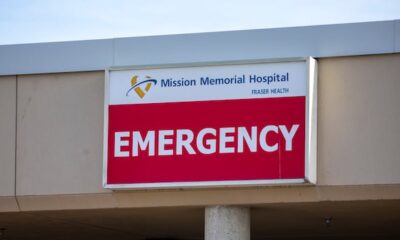Top Stories
Fraser Health Cuts Ties with Crisis Pregnancy Centre Amid Outcry

UPDATE: Fraser Health has officially distanced itself from the controversial Hope for Women Pregnancy Services, following escalating concerns from abortion rights advocates. This urgent decision comes as advocates push for clearer distinctions between legitimate medical clinics and crisis pregnancy centers that promote anti-abortion agendas.
Earlier today, Fraser Health confirmed via social media that it does not maintain any partnership, funding, or service contract with Hope for Women. This development follows complaints from several abortion rights organizations, including the Abortion Rights Coalition of Canada, which expressed alarm over Fraser Health’s previous collaboration with the organization.
Joyce Arthur, Executive Director of the Abortion Rights Coalition, stated, “Fraser Health took our concerns seriously,” highlighting the authority’s responsive actions to update its online presence and remove all references to Hope for Women. The implications of this distancing are significant, as Arthur emphasized that associations with crisis pregnancy centers can create a “public perception of support” that misleads those in vulnerable situations.
Crisis pregnancy centers are known for presenting themselves as neutral entities while advocating against abortion, which can confuse individuals seeking unbiased information. Teale Phelps Bondaroff, Chair of AccessBC, warned that people facing unplanned pregnancies need accurate, judgment-free information. “It’s crucial that they have access to all options,” he stressed.
In Canada, abortion is regulated under the Canada Health Act, making it accessible without parental consent or a doctor’s referral in British Columbia. The province provides resources for those seeking abortion services, directing individuals to the HealthLink BC website or to Options for Sexual Health at 1-800-739-7367.
Despite these resources, the existence of crisis pregnancy centers poses a real threat to informed decision-making. Arthur noted that many centers, including Hope for Women, do not refer patients for abortions, which she labeled as “disingenuous.” Their websites often contain disclaimers about not being medical facilities, yet they offer misleading information that can deter individuals from seeking necessary care.
The situation is exacerbated by the emotional vulnerability of those seeking help. As Phelps Bondaroff pointed out, the misleading practices of crisis pregnancy centers can lead individuals to waste time and resources, potentially impacting their access to timely abortions. “A delay could mean the difference between the type of abortion a person gets or whether they get to access one at all,” he added.
In addition to emotional manipulation, these centers may employ tactics such as offering recreational ultrasounds, which are not medically justified and can mislead patients about their pregnancy options. Health Canada has issued guidelines stating that ultrasounds should only be used for legitimate medical purposes, underscoring the risks associated with their misuse.
Fraser Health’s decision to cut ties with Hope for Women is a significant step in addressing these concerns. The health authority’s response highlights the increasing scrutiny on crisis pregnancy centers and their practices. As the conversation continues, advocates are urging further action to ensure that all pregnant individuals receive accurate information and support without judgment.
As this story develops, it remains crucial for individuals to be informed about the services available to them. For more information, individuals can consult their family doctors or refer to provincial resources aimed at guiding them through their options. The community is watching closely as Fraser Health navigates its responsibilities amidst growing advocacy for reproductive rights and accurate healthcare information.
Stay tuned for updates on this evolving situation and its implications for reproductive health access in Canada.
-

 Politics4 weeks ago
Politics4 weeks agoSecwepemc First Nation Seeks Aboriginal Title Over Kamloops Area
-

 World5 months ago
World5 months agoScientists Unearth Ancient Antarctic Ice to Unlock Climate Secrets
-

 Entertainment5 months ago
Entertainment5 months agoTrump and McCormick to Announce $70 Billion Energy Investments
-

 Science5 months ago
Science5 months agoFour Astronauts Return to Earth After International Space Station Mission
-

 Lifestyle5 months ago
Lifestyle5 months agoTransLink Launches Food Truck Program to Boost Revenue in Vancouver
-

 Technology3 months ago
Technology3 months agoApple Notes Enhances Functionality with Markdown Support in macOS 26
-

 Lifestyle3 months ago
Lifestyle3 months agoManitoba’s Burger Champion Shines Again Amid Dining Innovations
-

 Top Stories2 months ago
Top Stories2 months agoUrgent Update: Fatal Crash on Highway 99 Claims Life of Pitt Meadows Man
-

 Politics4 months ago
Politics4 months agoUkrainian Tennis Star Elina Svitolina Faces Death Threats Online
-

 Sports5 months ago
Sports5 months agoSearch Underway for Missing Hunter Amid Hokkaido Bear Emergency
-

 Politics5 months ago
Politics5 months agoCarney Engages First Nations Leaders at Development Law Summit
-

 Technology5 months ago
Technology5 months agoFrosthaven Launches Early Access on July 31, 2025





















